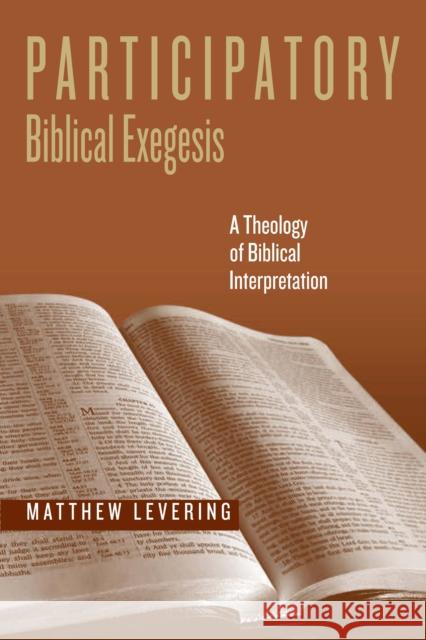Participatory Biblical Exegesis: A Theology of Biblical Interpretation » książka
Participatory Biblical Exegesis: A Theology of Biblical Interpretation
ISBN-13: 9780268034061 / Angielski / Twarda / 2008 / 328 str.
Participatory Biblical Exegesis: A Theology of Biblical Interpretation
ISBN-13: 9780268034061 / Angielski / Twarda / 2008 / 328 str.
(netto: 387,15 VAT: 5%)
Najniższa cena z 30 dni: 400,71
ok. 30 dni roboczych.
Darmowa dostawa!
The interpretation of Scripture has depended largely on the view of history held by theologians and exegetes. In Participatory Biblical Exegesis, Matthew Levering examines the changing views of history that distinguish patristic and medieval biblical exegesis from modern historical-critical exegesis.Levering argues for a delicate interpretive balance, in which history is understood both as a process that participates in God's creative and redemptive presence and as a set of linear moments. He identifies a split between theological and historical interpretations of scripture beginning in the high Middle Ages, considerably earlier than the emergence of historical-critical methods in the seventeenth and eighteenth centuries. Instead, he offers a vision of Scripture that is rooted in the exegetical practice of St. Thomas Aquinas and his sources but embraces historical-critical research as well. Participatory Biblical Exegesis provides an original theological basis for critical exegesis. It integrates the work of contemporary exegetes, philosophers, theologians, and historians to provide a compelling vision of biblical interpretation. "In recent years a number of theologians have addressed the growing awareness that a strictly historical approach to the interpretation of the Bible has run its course. . . . Levering's book is the most learned and sophisticated discussion of the issues to date." --Robert Louis Wilken, University of Virginia "Here one of the most prolific young Catholic theologians offers a stimulating diagnosis of what's missing from contemporary perspectives on biblical interpretation. Levering's focus on properly understanding the nature of 'history' can reorient not only Catholic interpreters but also other traditions, without denying the legitimate value of critical scholarship. His nuanced recovery of the church's classic wisdom abounds with theological richness and spiritual encouragement." --Daniel J. Treier, Wheaton College "This book presents an authoritative case for the reintegration of history and participation. Biblical interpretation, Levering claims, cannot rely on a purely linear view of history; instead, exegetes can only grasp the contents of the biblical text inasmuch as they participate in the faith of the Church. His sacramental hermeneutic, as well as his masterful display of scholarship, marks Levering as the true heir of Henri de Lubac, the great twentieth-century advocate of spiritual interpretation. This volume ought to function as a touchstone, both for Protestant and for Catholic approaches to sacred doctrine." --Hans Boersma, J.I. Packer Professor of Theology, Regent College











